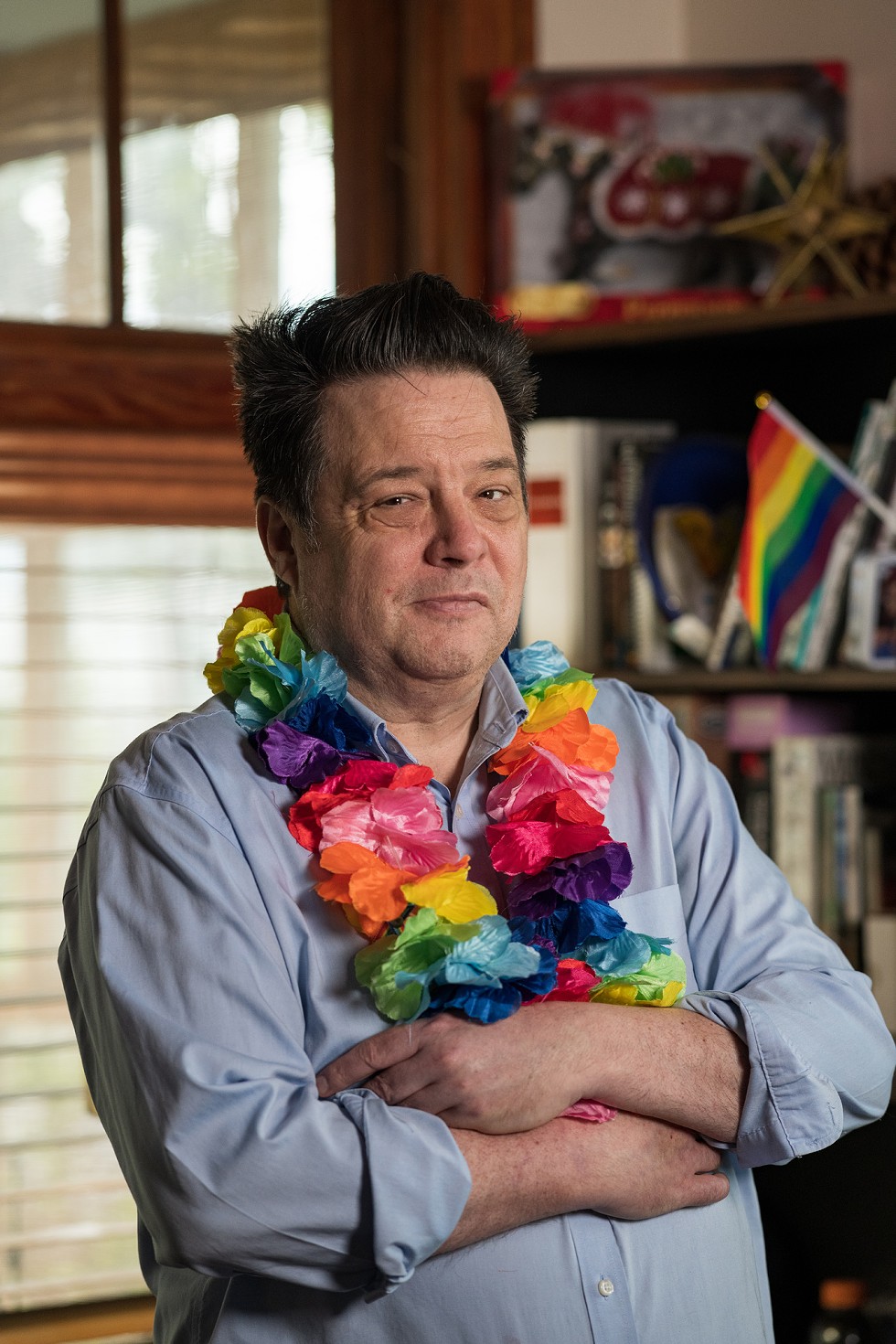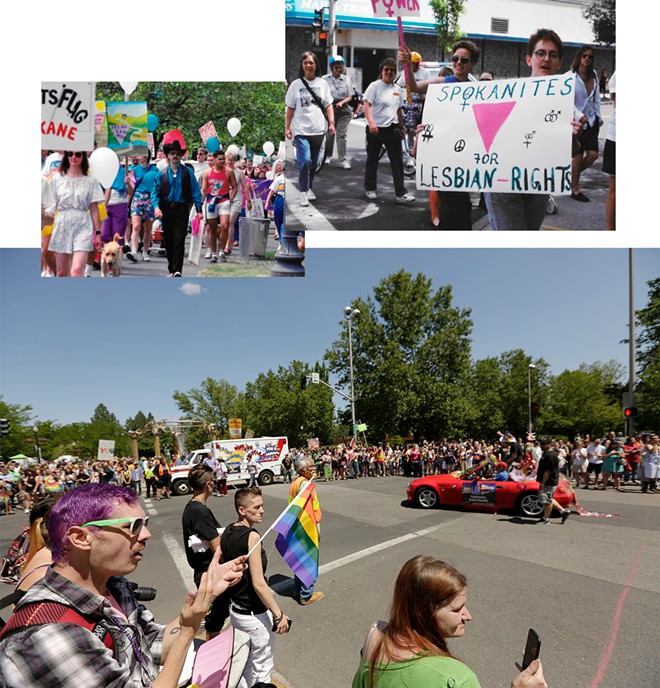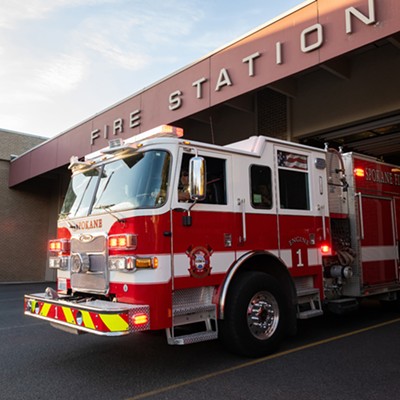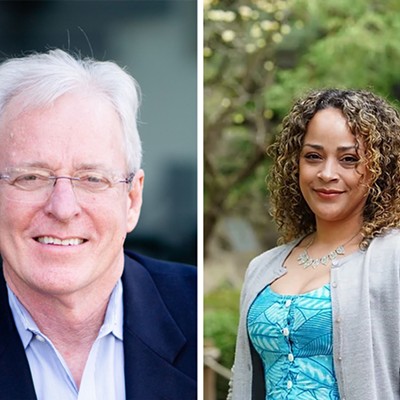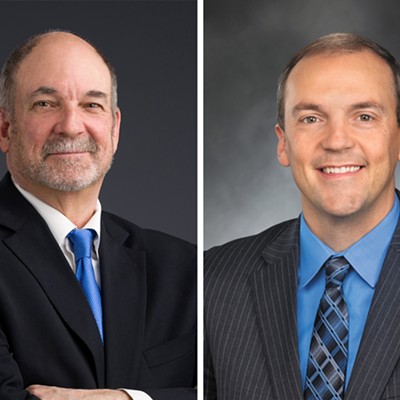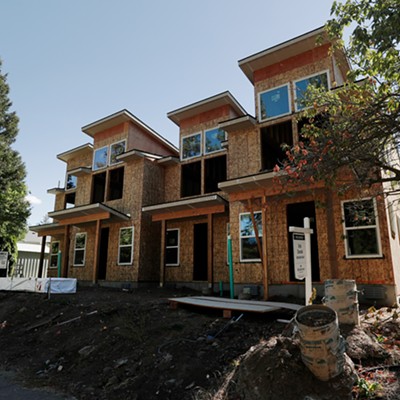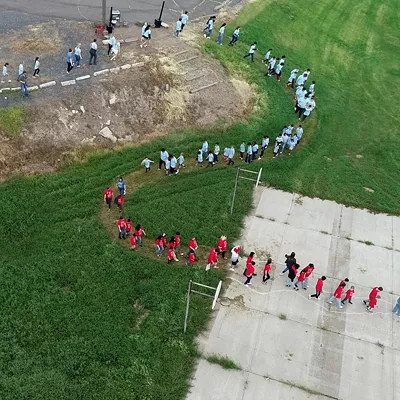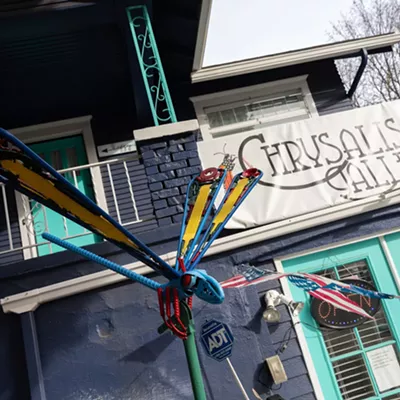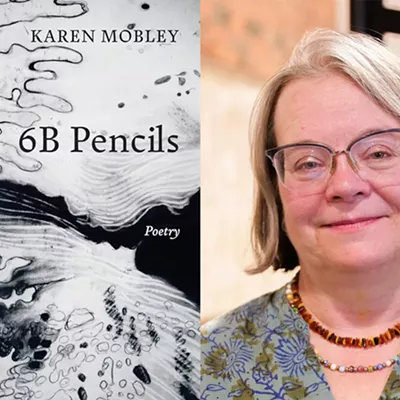In 1991, Michael Jepson was at one of Spokane's few gay bars when a lesbian friend came to him with shocking news.
"Oh my God, you're not going to believe this," Jepson recalls the friend saying. "There's going to be a Pride parade in Spokane."
"Really?" he replied. "In Spokane?"
Jepson was stunned. Spokane wasn't a very friendly place for LGBTQ+ people back then, he says, and being publicly out could lead to unwanted attention or even losing your job. Larger cities like New York had been holding Pride celebrations since the early '70s, but the idea of something like that happening in a city like Spokane was fairly unheard of.
Jepson remembers being nervous but also incredibly excited. On a sunny Sunday on June 3, 1992, he joined a crowd of LGBTQ+ people and their allies to march through downtown. Estimates vary, but most say there were at least a couple hundred attendees. Jepson remembers more than 1,000, though he admits that his memory of the event is rose-tinted.
"We're here, we're queer, we're fabulous, get used to it," the marchers chanted as they held signs and walked through Riverfront Park.
Jepson, 26 at the time, is bisexual. He wasn't out to most people in his life back then, which made marching in the first parade feel all the more empowering.
"Oh my gosh," Jepson says, "It was liberating and freeing and just glorious."
Pride is huge today. It's easy to forget the urgency — and danger — that early marchers faced. In the weeks leading up to the 1992 Pride, organizers received hate mail and threats. One person even called the police and warned that if the march was allowed to go on, they would shoot at it from the buildings above.
A number of marchers, including a friend of Jepson's who worked as a teacher, wore paper bags over their heads so they wouldn't be identified and lose their jobs.
None of the violence came to pass, but people did show up to protest and hand out homophobic pamphlets. In archival footage from KREM 2, one bystander said he was against "gayism" and that the marchers should take it somewhere else.
"The people who organized the first few Prides were really swimming an uphill battle," Jepson says.
Pride in Spokane looks very different today. The high-profile event has the institutional support of the city and dozens of corporate sponsors. There are numerous Pride events scattered throughout the entire month, and in non-COVID years, the festival draws upwards of 25,000 people — many of them from across the state.
This year will mark the 30th anniversary of Pride in Spokane. On Saturday, June 11, thousands will flock to downtown Spokane to celebrate. There will be a parade, with elaborate costumes, floats, dancing and music. In Riverfront Park, there will be festival booths, food, fireworks, local bands, drag queens, karaoke and an all ages dance party. There will be rainbow flags everywhere.
"It's really a magical thing," says Matthew Danielson, vice president of Spokane Pride.
Spokane's first Pride parade was organized by Marion Hammer and Helen Bonser. They were both heavily involved in Parents and Friends of Lesbians and Gays, or PFLAG. Hammer's son is gay, and she joined PFLAG after he started facing severe bullying in high school.
The group was inspired by Stonewall and other Pride parades in larger cities. They had talked for years about the possibility of organizing a Pride event in Spokane, but it wasn't until a picnic in the summer of 1990 that the idea really started to take shape.
"It was time; it had to happen," Hammer tells the Inlander.
Bonser died last year, but in 2015, she and Hammer recorded a conversation for StoryCorps in which they discussed what it was like to plan the city's first Pride Parade. In the recording, the pair remember struggling to rally community support in a town where many refused to acknowledge the existence of the LGBTQ+ community.
The first step was getting the business community on board. Most thought it was a crazy idea and weren't very supportive, Hammer says. The pair were eventually able to secure approval for the march, but only on the condition that they keep the march on the sidewalk so it wouldn't affect commerce.
After talking to businesses, Bosner and Hammer went to the police. They were also skeptical at first but agreed to help after Hammer explained that she was organizing the parade out of love for her son.
"It was kind of standoffish at first, but I think everybody loves their kids, and I think that really made a difference," Hammer says.
In the months leading up to the march, threats started to pour in, and people became increasingly anxious. Bosner got calls from various groups and individuals around town who said they were scared and didn't know if they would be able to attend. Bosner understood their concerns and told people they didn't have to come if they felt unsafe. But even if only three people showed up, the pair were determined that the march would go on.
Miraculously, the march went off without a hitch.
"It was a jolly good time," Hammer says. "I think we put on a pretty good show for Spokane."
Hammer says organizing Spokane's first Pride might be her favorite thing she's ever done.
The success of the first Pride event "ripped the band-aid off," Jepson says. He started volunteering with the parade in the 2000s, and later served as a board member for OutSpokane, which later changed its name to Spokane Pride and continues to run the parade. Jepson has watched the parade grow rapidly over the years, alongside broader acceptance for the LGBTQ+ community.
Hammer moved away from Spokane a few years after the first Pride Parade, but says she's been heartened to watch it grow from afar. The idea that it would one day get this big barely occurred to her and Bosner in 1991. Back then, the main issues driving her activism were employment discrimination and the bullying LGBTQ+ kids faced in schools. Marriage equality seemed like a distant fantasy.
The tone of Spokane's Pride events has also shifted. The first one was less of a parade and more of a march, Jepson says. While there's still activism and advocacy, modern Pride events tend to be less political and more of a joyful celebration. While he doesn't miss the marginalization the event faced in the early days, Jepson does think there was something special about the way they faced the world with defiance in the early '90s.
Spokane Pride now is a 501 nonprofit organization, which means they "can't get crazy about politics," Danielson says. Still, the organization tries to stay true to its activist roots. A few years ago, they made shirts that read "The first Pride was a riot" — a reference to Stonewall.
"I like to see it as kind of an evolution," Danielson says.
Spokane's Pride festival still draws protesters, though Danielson says there haven't been many in recent years. The organization has volunteers called angels, who dress up in white with large wings that they use to block out the protesters.
But while tolerance has increased, the struggle for acceptance isn't over.
For some organizers, a wave of attacks and backlash against LGBTQ+ people over the past year has raised alarm bells. Attempts to ban gender-affirming care and discussions of LGBTQ+ topics in schools have made their way to numerous states — with wild accusations of "grooming" being hurled at anyone who opposes them.
"I still believe those who are opposed to LGBTQ+ rights are losing the culture war," Jepson says, "but I think they're redoubling their efforts in defiance."
WHERE TO SHOW YOUR PRIDE
SPOKANEThe 30th Spokane Pride Parade and Festival takes place on Saturday, June 11, and this year's theme for both events is "Reimagine." The parade in downtown Spokane starts at noon, and the festival runs from noon to 6 pm in Riverfront Park. Visit spokanepride.org for more information and a full schedule.
COEUR D'ALENE
The North Idaho Pride Alliance is hosting Pride in the Park on Saturday, June 11, from 10 am-3 pm at the Coeur d'Alene City Park and Bandshell. The free event includes food, entertainment, a family/kids area and more than 50 vendors in the Community Village and Artisan Market. Visit nipridealliance.com for more information and a full schedule.
SANDPOINT
The 2022 Sandpoint Pride Festival is happening Wednesday-Thursday, June 15-16, at Sandpoint's Granary Arts District, 513 Oak St. There will be live performances, music, guest speakers, advocacy booths and drag shows, along with food, beverages and a family-friendly area. Visit sandpointpride.com for more information and a complete schedule.
In many smaller towns, where Pride celebrations have only recently begun to establish themselves, the attacks have been especially pronounced.
The North Idaho Pride Alliance, which hosted its first Pride celebration in 2015, has been subjected to a barrage of threats and harassment while planning its June 11 Pride in the Park celebration in Coeur d'Alene.
Threatening messages circulated on social media and a motorcycle club used violent rhetoric when announcing its plans to hold a simultaneous rally at the park to take a stand against what it sees as an "LGBT grooming agenda."
Pride in the Park has had a few outside protesters show up in past years, but never anything this serious, says Jessica Mahuron, outreach director for the North Idaho Pride Alliance. She says the hateful speech started picking up around October 2021, and has since escalated to levels she's never seen before.
"It's incredibly surprising in 2022," Mahuron says. "You saw so much progress ... and now for this very strong resurgence of hate."
Mahuron stresses that the North Idaho Pride Alliance isn't going to let the threats stop them. The organization has been reporting threats to the police and plans for volunteer peacekeepers to circulate at the event to make sure everyone feels safe.
News about the hateful messages also prompted a record-breaking number of volunteers to sign up to support the event. Mahuron recalls talking to one volunteer who is transgender and recently moved to Idaho from Minneapolis. The volunteer said she wasn't as involved in Pride events back home because acceptance was so widespread it almost felt performative, but after moving to Idaho "it became a necessity to get involved and take action," Mahuron says.
Pride is continuing to spread to even smaller towns across the Inland Northwest. Newport and Sandpoint held their first ever Pride rallies last year, and Mahuron says she's been in touch with people in Wallace who are talking about hosting the city's first Pride event.
Mahuron says the organization's approach to hateful messages can be summed up in their theme for Pride month this year: "Exist louder."
"We are going to shine bright and organize events for the community regardless," Mahuron says. "We're a pretty resilient bunch." ♦

